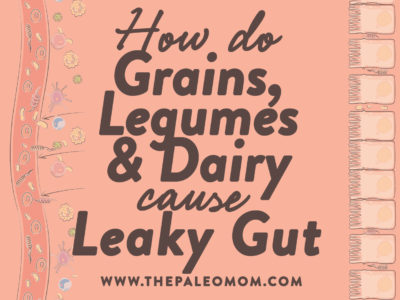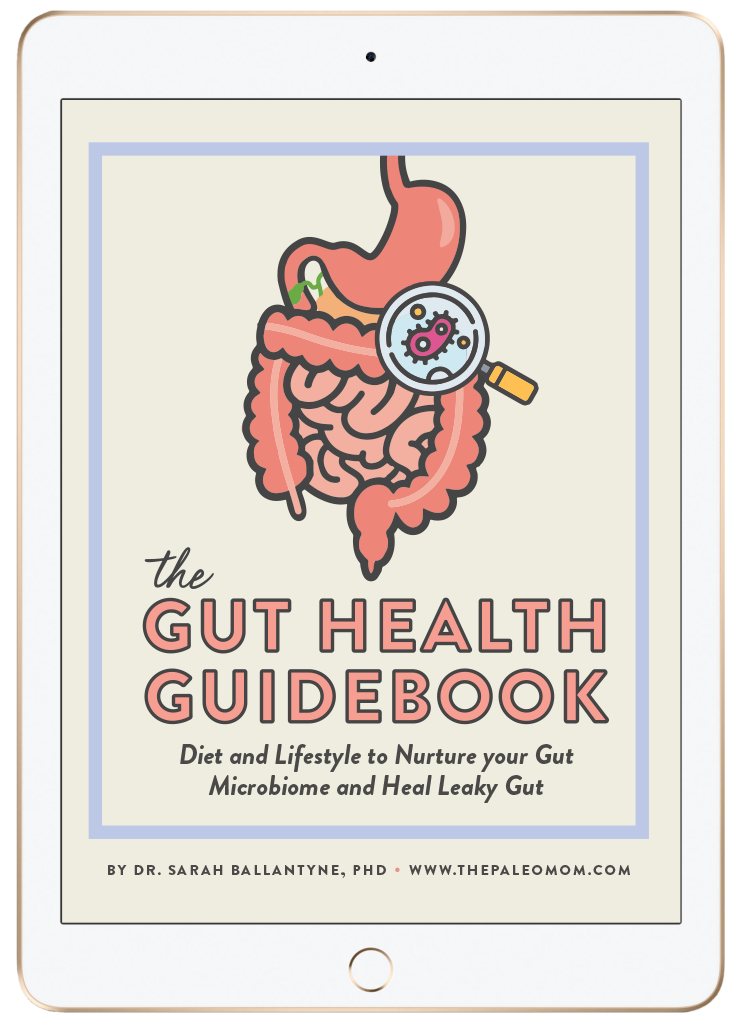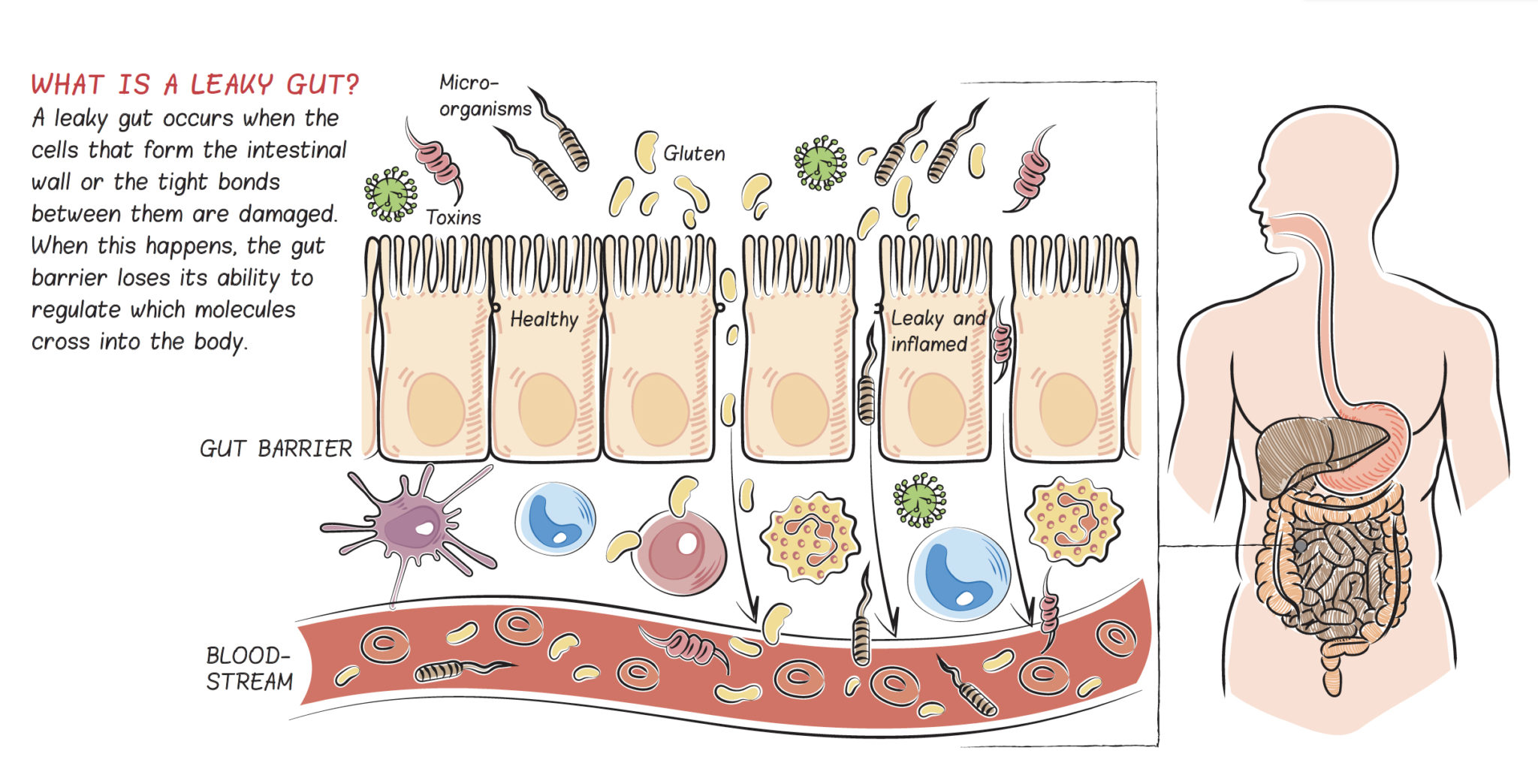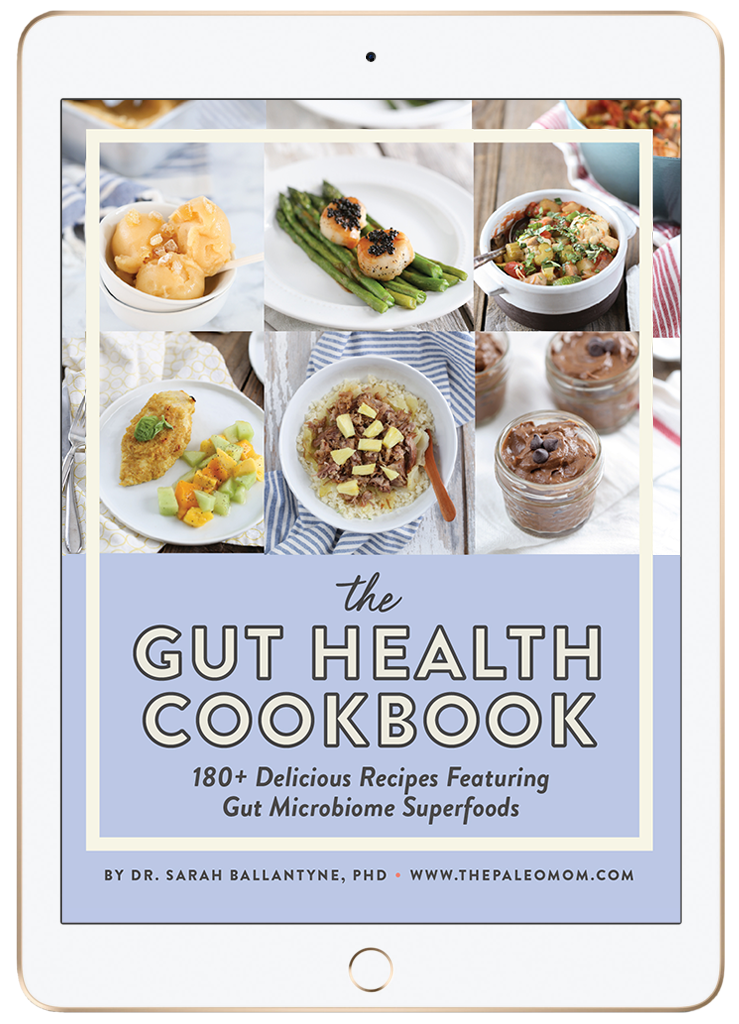One of the fundamental principles of the Paleo diet is to support gut health. But, that doesn’t just mean eating plenty of fermented foods and fiber to feed our microbiome (although both of those things are definitely important! See What Is Fiber and Why Is it Good? and The Health Benefits of Fermented Foods). It also means protecting the lining of the gut by eliminating foods that damage it.
In Part 1 of my “Why Grains are Bad” series, we took a detailed look at how lectins can damage the gut, either by directly harming the cells that line our intestines or by allowing foreign substances to “leak” through the gut wall and enter the bloodstream. (In turn, a “leaky gut” can set the stage for a number of other health conditions, including autoimmune diseases.) Since grains and legumes are both high in potentially harmful lectins, avoiding these foods is an important step in promoting gut health and allowing previous damage to heal.
But, lectins aren’t the only way certain foods can cause a leaky gut! Grains and legumes contain saponins and protease inhibitors that can worsen the damage caused by lectins, and dairy is actually designed to promote a leaky gut as part of early nutrition in mammals.
Legumes and pseudo-grains (like quinoa and amaranth) are high in saponins, which are compounds with detergent-like properties. Saponins are designed to protect plants from consumption by microbes and insects by dissolving the cell membranes of these potential predators. All plants contain saponins, but they’re often concentrated in the seed.
Saponins consist of a fat-soluble core (having either a steroid or triterpenoid structure) with one or more side chains of water-soluble carbohydrates. This combination of both a water-soluble and a fat-soluble component is what makes saponins act like a detergent, i.e., something that can make oil and water mix. Because of their detergent-like structure, saponins can interact with the cholesterol molecules imbedded in cell surface membranes, create holes in the surface membrane of the cells that line our gut (enterocytes), allowing a variety of substances found in the gut to enter the cell.
A number of different types of saponins exist, and some bind more easily and more tightly to cholesterol molecules in cell membranes than others. As a result, different saponins can create larger or smaller pores, which may be more or less stable. The larger, more stable (and/or more numerous) the pores, the more difficult it is for the enterocyte to recover. Small doses of some dietary saponins (like those found in fruits and vegetables) might play a helpful role in the absorption of some minerals. But, legumes and pseudo-grains contain very high doses of saponins (and, in general, contain types of saponins that interact more strongly with cholesterol). Dietary saponins from these foods are known to increase the permeability of the gut, likely by killing enterocytes (cells, in general, do not survive large, irreversible changes in membrane permeability).
Interestingly, even when a sub-lethal amount of saponin pores form in the enterocyte surface membrane, the cell loses its ability to actively transport nutrients, especially carbohydrates. While slowing down sugar transport from the gut to the bloodstream seems like a great thing on the surface (why beans are so often recommended as a carbohydrate source for diabetics!), the irreversible increase in gut permeability is just not worth it!
When large amounts of dietary saponins are consumed (especially in the presence of an already leaky gut), saponins can leak into the bloodstream. At sufficient concentrations, they cause hemolysis (destruction of the cell membrane of red blood cells). Saponins also have adjuvant-like activity, which means that they are able to affect the immune system leading to the production of pro-inflammatory cytokines (chemical messengers that tell white blood cells to attack) and can further contribute to inflammation in the body.
But the leaky gut story doesn’t end with saponins! Grains, pseudo-grains, (like buckwheat) and dairy contain protease inhibitors. Protease inhibitors are the seed’s attempt to escape digestion completely. These are compounds designed to neutralize the digestive enzymes that would normally degrade the plant’s proteins (and toxins) into their individual component amino acids. However, when protease inhibitors are present in our digestive tract, it affects degradation of all proteins present at that time. When our bodies sense the need to increase protein digestion, the pancreas secretes more digestive enzymes into the small intestine.
Because some digestive enzymes are being inhibited (the proteases which break down protein) while others are not, the balance between the different digestive enzymes is thrown off. One enzyme that ends up in excessive quantities during this process is trypsin, an enzyme that is very good at destroying the connections between cells. If we have a large concentration of trypsin in our small intestine, it can weaken the connections between the enterocytes, creating a pathway for the contents of the gut to leak into our blood stream. To make matters worse, in the presence of an already leaky gut, incompletely digested proteins that cross the enterocyte layer stimulate the resident immune cells of our gut to release inflammatory cytokines and produce antibodies. The result is increased inflammation!
Dairy is designed to create a leaky gut. Scientists still don’t understand all the mechanisms through which dairy products can create a leaky gut. But, it seems to be an important aspect of what dairy is designed to do: feed babies (of the same species) optimal nutrition for rapid growth. In newborn infants, a leaky gut is essential so that some components of mother’s milk can get into the blood stream, like hormones and all the antibodies that a mother makes that helps boost her child’s immune system. When we’re young, a leaky gut is actually a good thing! But, while this is essential for optimal health in babies, it becomes a problem in the adult digestive tract where there are more things present that we don’t want to leak into the blood stream. Drinking milk from a different species seems to make matters worse since the foreign proteins can cause a larger immune response.
The bottom line? Avoiding grains, legumes, and dairy on a Paleolithic diet is about more than replicating the actions of our ancestors. We have ample evidence that these foods can harm our gut health (as well as exacerbate the problems caused by other modern diet and lifestyle components!), and that replacing them with nutrient-dense foods that support rather than damage the gut is key for getting and staying healthy!
Citations
Francis G, et al. “The biological action of saponins in animal systems: a review.” Br J Nutr. 2002 Dec;88(6):587-605.
Gee JM, et al. “Effects of saponins and glycoalkaloids on the permeability and viability of mammalian intestinal cells and on the integrity of tissue preparations in vitro.” Toxicol In Vitro. 1996 Apr;10(2):117-28.
Gee JM, et al. “Saponins of quinoa (Chenopodium quinoa): Effects of processing on their abundance in quinoa products and their biological effects on intestinal mucosal tissue.” Journal of the Science of Food and Agriculture. 1993;63(2):201-209.
Johnson IT, et al. “Influence of saponins on gut permeability and active nutrient transport in vitro.” J Nutr. 1986 Nov;116(11):2270-7.
Rackis JJ, et al. “Protease Inhibitors in Plant Foods: Content and Inactivation.” Nutritional and Toxicological Significance of Enzyme Inhibitors in Food. Volume 199 of the series Advances in Experimental Medicine and Biology. 299-347.
Ryan CA. “Protease Inhibitors in Plants: Genes for Improving Defenses Against Insects and Pathogens.” Annual Review of Phytopathology. 1990;28:425-449.








 Yeast-Based Paleo Bread
Yeast-Based Paleo Bread